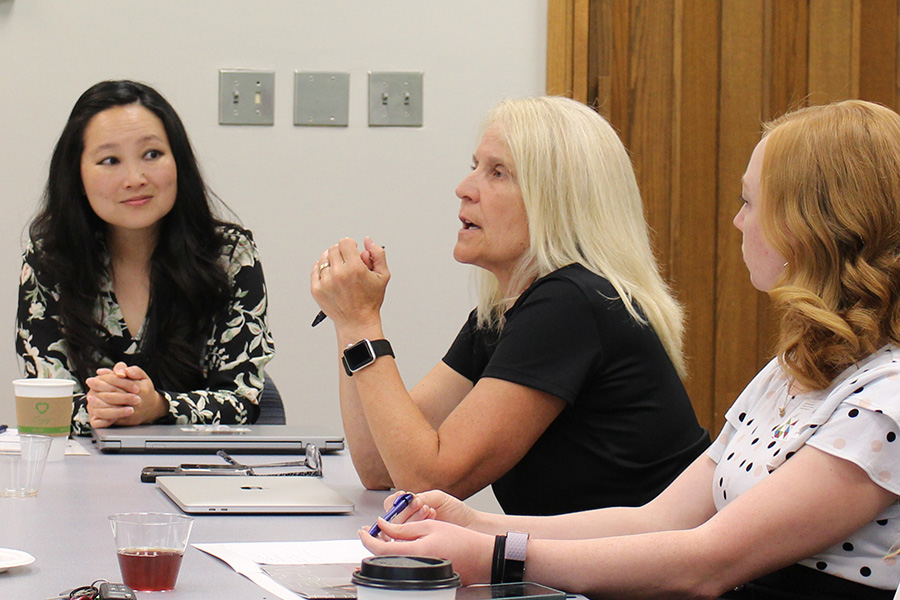Summer meetings show BHECN-ARPA support benefits Nebraska

BHECN Central Director Krista Fritson, PsyD, center, talks at a gathering of ARPA awardees at the University of Nebraska Kearney in June.
A key take-home message following BHECN summer meetings with those who received funding from the American Rescue Plan Act (ARPA) Awards Program was clear – the dollars distributed by the program have had a real impact in Nebraska.
Summer workshops in Kearney, Chadron, Scottsbluff, Wayne and Omaha hosted organizations that received portions of the $25.5 million in ARPA funds allocated to BHECN by the Nebraska Legislature in 2022. The organizations described how the support they received has helped them address key behavioral health workforce challenges.
Many of the projects supported by ARPA directly align with BHECN’s efforts to address the state’s shortage of behavioral health workers, said BHECN Director Marley Doyle, MD.
“It was very gratifying to hear that the ARPA dollars are working how they are intended to work,” Dr. Doyle said. “Although we’re only a year into the program, the impact our awardees are having on the behavioral health workforce in this state is truly remarkable.”
ARPA funds helping recruit and retain at Northeast Community College
At Northeast Community College (NCC) in Norfolk, Gina Krysl used ARPA funding to add a second counselor, Alexis Huisman, to the NCC student counseling team. Hiring Huisman served a dual purpose; bringing on a new counselor to meet the growing behavioral health concerns of students and retaining Krysl herself.
Bringing on the second counselor provided significant relief from burnout and an overbearing caseload that Krysl said the funding may have kept her in her role at the college. After losing three students to suicide last fall, Krysl had support from Huisman to debrief, consult and grieve together. Had she been on her own through this, Krysl feared she would have felt overwhelmed and considered resigning.
Now with Huisman on board, Krysl’s caseload is more manageable and the NCC counseling office doubled the number of students they serve. This is important as the school is seeing a continuous increase in the need for behavioral health services among its student population.
Along with hiring Huisman, the ARPA support allowed the office to bring on a student intern this summer who provided services and additional support for students. This support allowed the office to do prevention programming and outreach to the campus community, Krysl said.
ARPA support clearing career pathways
In Omaha, ARPA funds helped support a graduate assistant position for Sharilyn Tuttle at the University of Nebraska Omaha Grace Abbott Training and Supervision Academy. Tuttle, who is entering her last semester as a Master of Social Work student at the Grace Abbott School of Social Work, said securing a paid position was helpful on multiple levels.
Furthermore, through her new position, she connected with other BHECN offerings, including a stipend program that pays for practicum experiences in rural areas. Through the stipend, Tuttle is completing a social work practicum in her hometown of Grand Island, an experience she said solidified her desire to be a clinical social worker in rural Nebraska.
“There are different challenges to providing behavioral health in rural areas and this experience is helping me prepare to do this important work,” Tuttle said.
ARPA dollars having statewide impact
Some other examples of ARPA success shared at the gatherings included:
- Options in Psychology, which has several offices in western Nebraska, used ARPA funds to recruit multiple psychology doctoral interns – most of whom plan to stay in the area once their training is complete. The professionals recruited through these internships help address a key workforce shortage area for the Panhandle region.
- Quality Healthcare Clinic, an integrated care clinic in Sutton, used ARPA support to increase behavioral health capacity in a part of the state where the workforce shortage is particularly intense. The clinic hired one full-time and two part-time behavioral health providers, established telebehavioral health capacity and marketed its new offerings to the communities served by the clinic.
- At Chadron State College, Brittany Helmbrecht, DHEd, instituted a campus wellness program to reduce stigma around mental health treatment, promote a sense of belonging and improve stress management. As part of the effort, Helmbrecht hosted an on-campus behavioral health presentation for Chadron State athletes on performance anxiety, which drew more than 300 students and others.
Hearing so many stories about ARPA awards improving behavioral health in Nebraska is an affirming experience for the BHECN team, said BHECN-ARPA Awards Program Director Jessie Buche, MPH, MA.
“We truly believe the ARPA program is a transformational development for behavioral health in Nebraska and hearing about the work of our awardees only strengthens that belief,” Buche said. “We are incredibly excited to see what continues to come from this amazing project.”